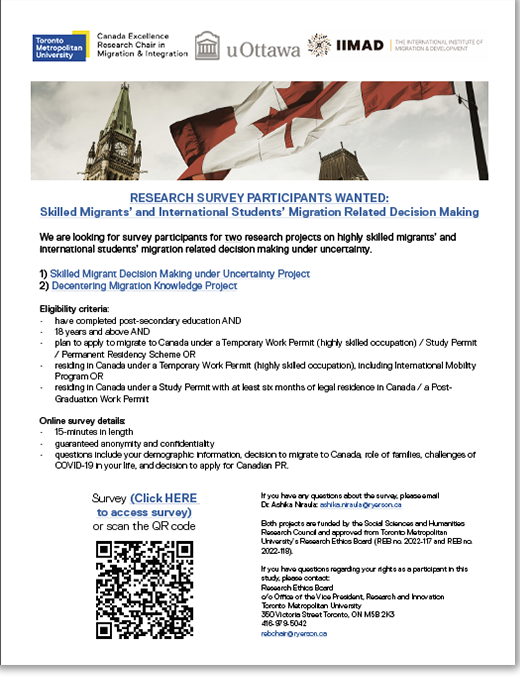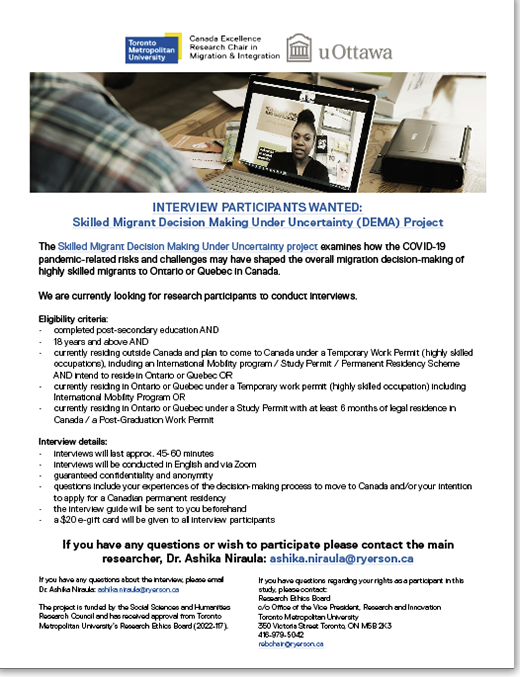Implementation Plan
This project is conducting primary research on the decision-making of English-speaking and French-speaking highly skilled migrants and international students to migrate to Canada. Starting by reviewing the relevant literature, the research adopts a mixed-methods approach using complementary quantitative (an online survey), qualitative (semi-structured qualitative interviews and focus groups, conducted online, or in person if possible), and quasi-experimental methods (where a group of highly skilled migrants are faced with a fictitious context within which they have to make decisions).

This phase includes a detailed literature review and expert interviews with relevant anglophone and francophone stakeholders involved in Canadian immigration management. Semi-structured in-depth interviews with 22 anglophone stakeholders and 12 francophone stakeholders were conducted. Stakeholders included government officials, settlement service providers, immigration lawyers, credential evaluation providers, trade union representatives, journalists, and post-secondary education institution representatives. Outputs to include:
Publications:
- Castaneda, R. A., & Niraula, A. (2023). The cost of mobility: International Students in the Tertiary Level (external link) . IOM Migration Policy Practice.
- Niraula, A., Triandafyllidou, A., & Akbar, M. (2022) Navigating Uncertainties Evaluating the Shift of Canadian Immigration Policies during the COVID-19 Pandemic. Canadian Public Policy Journal. https://doi.org/10.3138/cpp.2022-010 (external link)
- Niraula, A., & Triandafyllidou, A. (2022) (PDF file) Highly Skilled Migrant Decision-Making under Uncertainty: A literature review. Working Paper Series Toronto Metropolitan Centre for Immigration and Settlement (TMCIS) and CERC in Migration and Integration.
Dissemination:
- Webinar entitled, Understanding the lasting impact of policy changes on highly skilled migrants’ decision-making: Comparative perspectives in post-pandemic times, organized on Feb. 2, 2023 at CERC Migration, Toronto Metropolitan University, Canada.
- Presentation at Global crises as catalysts: International student and post-graduate mobility patterns conference, Mar. 18, 2022 at Aarhus University, Denmark.
- Conference panel Understanding high-skilled migration through the lens of lived experiences, organized for the 19th IMISCOE Annual Conference, Jun. 29 to Jul. 1, 2022 in Oslo, Norway.
- Presentation at Canadian Association of Geographers Conference 2022, Towards Canada 2050: Shaping the Future of Geographic and Spatial Analysis, May 30 to Jun. 3, 2022, in Toronto, Canada.
An English online survey among English speaking prospective and actual highly skilled migrants and international students who intend to migrate to Canada has been completed. More than 1000 participants took part in the online survey, and we are in the process of cleaning, coding, and analysing the survey data. The online survey explored if the pandemic has influenced participants’ decisions to come to Canada and in what direction (stay/come or move/leave/return); if it has affected the temporality or motivation of the decision; which concerns have been most important in their decision making; and what other motivations and factors are important in their decisions. The survey has also identified sources of information affecting migration plans; the role of socio-demographic factors like age, gender, sector of employment, family situation, and country of origin in migration decision-making; and how changes in immigration policies, employment prospects, and health risks influenced their decision to apply for permanent residency in Canada.
The French online survey, which focuses on prospective and actual French-speaking highly skilled migrants and international students in Canada, will begin in April 2023.
Outputs to include:
Publications:
- Niraula, A. (2022). Engaging with Different Ethical Regimes. DEMIKNOW Blogs.
- Project report, policy brief and two journal articles.
- Dashboard and related infographics will be produced to show how different factors affect decision making.
Dissemination:
Presentation at International Studies Association Annual Convention, March 15 to 18, 2023, Montreal, Canada.
130 semi-structured in-depth interviews were conducted with English speaking highly skilled migrants and international students to examine when and how these migrants make their migration decisions, what individual and family strategies they put in place to address the new situation influenced by the onset of COVID-19. Interview questions were designed to examine the role of social networks and the migrants’ interaction with relevant stakeholders. Interviews were limited to highly skilled migrants and international students currently residing in/intending to reside in Ontario and Quebec, the two largest provinces and main destinations of immigrants.
From April 2023, we will begin the interviews with French-speaking highly skilled migrants and international students who intend to come to Quebec or Ontario as well as those who are currently residing in Quebec or Ontario.
This phase aims to shed light on how critical junctures of the pandemic shaped migration-related decision-making and offers insights into how policies and services may affect English-speaking and French-speaking highly skilled migrants’ and international students’ migration decision-making.
Outputs include:
Publications
- Niraula, A., & Castaneda. R. A. (2022). The pandemic created challenges and opportunities for Canadian immigration. (external link) The Conversation.
- Two peer refereed articles (on intersectionality and decision making under the pandemic).
- Short documentary with interviewees on the challenges they have faced during the pandemic.
Dissemination:
Presentation at the XX ISA World Congress of Sociology, June 25-July 1, 2023 in Melbourne, Australia.
Six focus groups (three in Ontario and three in Quebec) will be conducted to examine what prospective migrants propose as effective measures and initiatives that federal, provincial or local authorities and non-state actors can put in place to address the current situation and how this has shaped, or could shape their decisions to migrate to Canada. The findings of this phase will lead to recommendations to guide Canadian policy makers and other stakeholders. Output:
- Policy paper addressing provincial and federal policy makers
Three experiments will be conducted in which participants are presented with two scenarios and are offered specific choices. Participant responses will reveal how services and programs offered to mitigate risk and address uncertainty affect their decision making. These experiments will make possible a deeper understanding of the decision making of highly skilled migrants when faced with critical junctures such as a pandemic. While these experiments are conducted in Ontario, their results will be applicable in any provincial contexts.
This final phase is comprised of a book project that will bring together the results of the project.

